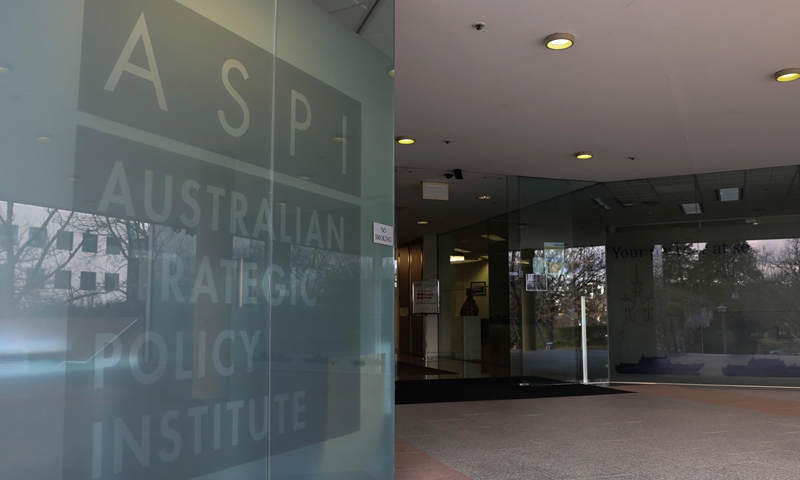Beijing bans entry to 2 anti-China Aussie scholars
Source: Global Times Published: 2020/9/24 11:13:22
Aussie scholars' ban shows China's resolve to oppose denigration: experts

Photo taken on June 23, 2020 shows the logo of Australian Strategic Policy Institute in an office building, in Canberra, Australia.(Xinhua)
China has banned Australian anti-China scholar Clive Hamilton and think tank Australian Strategic Policy Institute (ASPI) analyst Alexander Joske from entering the country, under the country's Exit and Entry Administration Law, the Global Times learned from sources.
A Chinese expert said the travel ban reflects China's refusal to subject itself to such connivance of denigration under the guise of scholarly work. But he rejected that China's move is a tit-for-tat act of retaliation in response to the recent move by Australian authorities who revoked the visas of two Chinese scholars over alleged infiltration in early September.
Whether a foreign national is allowed to enter China is China's choice, and China welcomes foreigners to study, work and live in China but opposes any attempt to spread fake information, smear and attack China under the guise of academic research, Wang Wenbin, spokesperson of the Chinese Foreign Ministry, said at Thursday's routine media briefing.
The current difficult situation in China-Australia relations is mainly due to Australia's repeated wrong actions on issues involving China's core interests such as China's sovereignty and territorial integrity. It placed unreasonable restrictions on normal exchanges and cooperation between China and Australia, and seriously undermined mutual trust, Wang said.
Clive Hamilton is a professor of public ethics at Charles Sturt University in Canberra. Since 2017, he has published books and reports accusing China of "influencing and infiltrating" Western countries, including Australia and the US, by stealing intelligence through public information and hacking.
He published the book, Silent Invasion: China's influence in Australia in 2018, then published another book, Hidden Hand: Exposing How the Chinese Communist Party is Reshaping the World, hyping up China's "influence" in Australia.
Due to its extremely absurd views and groundless content, Silent Invasion: China's influence in Australia was rejected for publication several times.
Joske is an analyst at ASPI, an Australian think tank infamous for churning out anti-China propaganda and generating anti-China issues.
Since joining ASPI in 2018, Joske has frequently published articles accusing Chinese universities of engaging in international cooperation for "military purposes," and hyping the case of "Chinese spy" Wang Liqiang with Australian journalists.
In 2018, Joske published the report titled, Picking Flowers, Making Honey: The Chinese Military's Collaboration with Foreign Universities, which claimed that the Chinese military sponsored thousands of military scientists and engineers to study abroad. In 2019, he published another report, The China Defense Universities Tracker: Exploring the military and security links of China's universities, accusing Chinese universities of taking advantage of the cooperation with Australian universities and research institutions to carry out cyber attacks, and to steal secrets related to cutting-edge weapons.
In response to concerns if China's move was made against Australia's previous cancellation of the visas of Chinese academics Chen Hong and Li Jianjun over alleged security risks, Chen Hong disagreed.
"I don't think the declaration of the two Australian nationals as personae non grata is a tit-for-tat act of retaliation," Chen, professor and director of the Australian Studies Center at East China Normal University, told the Global Times on Thursday.
The travel ban on Hamilton and Joske is based on their ceaseless anti-China efforts, Chen said. "They are not individual academics, but actors of the smear and slander campaign in Australia against China."
Chen said, "The travel ban reflects China's refusal to subject itself to such connivance of denigration under the guise of scholarly work."
However, the Australian authorities' revocation of the visas of the two Chinese academics was unjustified, Chen noted.
"To date Australian authorities have not produced anything to support the unwarranted act, because there simply isn't any evidence, Chen said, noting that the two Chinese academics are not anti-Australia, as the academics are veteran scholars dedicated to studies of Australia, with a plain aim to promote better understanding and friendship between the two countries and peoples.
RELATED ARTICLES:
Posted in: SOCIETY